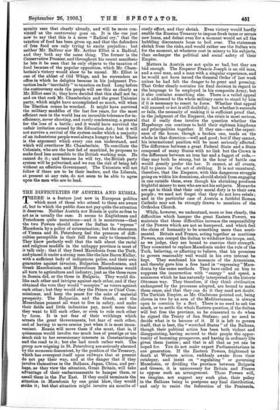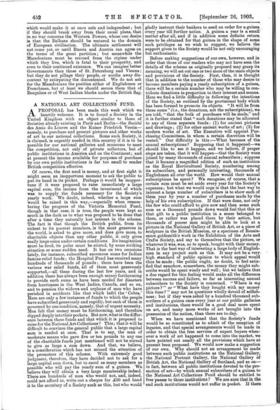THE DIFFICULTIES OF AUSTRIA AND RUSSIA. T HERE is a feature
just now in European politics which most of those who attend to them are aware of, but to which the public does not pay quite the attention it deserves. Neither Austria nor Russia is quite so free to act as is usually the case. It seems to Englishmen and Frenchmen quite monstrous—and it is monstrous—that the two Powers should allow the Sultan to " repress " Macedonia by a policy of extermination; but the statesmen of Vienna and St. Petersburg feel the pressure of diffi- culties perceptible in their full force only to themselves. They know perfectly well that the talk about the racial and religious muddle in the unhappy province is most of it talk only; that if they freed Macedonia from the Turk, and placed it under a strong man like the late Baron Kallay, with a sufficient body of indigenous police, and their own guarantee against invasion, Bulgarian Macedonians, and Greek Macedonians, and Mussulman Macedonians would all turn to agriculture and industry, just as the three races in Bosnia did, or the three in Bulgaria. They would dis- like each other and intrigue against each other, and if they obtained the vote they would " conspire " as voters against each other; but they would obey the Prince or Chief Com- missioner, and keep the peace for the sake of material prosperity. The Bulgarian, and the Greek, and the Mussulman peasant all want to live in safety, and make their fields and little industries pay, much more than they want to kill each other, or even to rule each other by force. It is not fear of their writhings which arrests the great Governments, but fear of each other, and of having to move armies just when it is most incon- venient. Russia will move them if she must, that is, if quiescence would involve too much loss of prestige or too much risk to her reversionary interests in Constantinople and. the road to it ; but she had much rather wait. The group now reigning in St. Petersburg are seriously alarmed by the economic discontent, by the position of the Treasury, which has overspent itself upon railways that at present do not pay their way, and at the danger that if they involve themselves in the Balkans, Japan, China, and per- haps, as they view the situation, Great Britain, will take advantage of their embarrassments to hamper them, or assail them in the Far East. If they could terminate the situation in Macedonia by one great blow, they would strike it; but that situation might involve six months of costly effort, and they shrink. Even victory would hardly enable the Russian Treasury to impose fresh taxes or secure new loans, and defeat even for a moment would set all the bubbling discontents loose to boil over. The statesmen shrink from the risks, and would rather see the Sultan win for the moment, at whatever cost in misery to his subjects, than endanger the political and social safety of their Empire.
Matters in Austria are not quite so bad, but they are bid enough. The Emperor Francis Joseph is an old man, and a cool man, and a man with a singular experience, and he would not have issued the General Order of last week unless he had felt the danger to be great and pressing. That Order clearly contains his final decision in regard to the language to be employed in his composite Army, but it also contains something else. There is a veiled appeal in it addressed to the whole military caste to stand by him if it is necessary to resort to force. "Whether that appeal will succeed or not is still doubtful ; but whether it succeeds or fails, the necessity of making it is sufficient proof that, in the judgment of the Emperor, the crisis is most serious, that it really does involve the question whether the Hapsburgs can continue to hold their eighteen kingdoms and principalities together. If they can—and the experi- ence of the house, though a broken one, tends on the whole in that direction—well and good; but if they cannot, his international position will be most seriously affected. The difference between a great Federal State and a State composed of many States with no link but the Crown is the difference between an iron bar and a faggot of rods,— they may both be strong, but in the hour of battle one would greatly prefer the bar. It cannot, at all events, fall to pieces in the act of striking. It is not unnatural, therefore, that the Emperor, with this dangerous struggle going on within his dominions, should shrink from engaging in one outside them, even though his shrinking produces frightful Misery to men who are not his subjects. Monarchs are apt to think that their only moral duty is to their own people ; we need not forget that they do not love rebels ; and in the particular case of Austria a faithful Roman Catholic may not be strongly drawn to members of the Orthodox Church.
While, however, we understand, more or less clearly, the difficulties which hamper the great Eastern Powers, we maintain that those difficulties increase the responsibility of the Powers which are not so hampered, and which feel the claim of humanity to be something more than senti- mental. Britain and France, acting together as maritime Powers, can compel the Sultan to withdraw his troops, and, as we judge, they are bound to exercise their strength. They consented to replace Macedonia under the rule of the Turk, believing, or affecting to believe, that his promises to govern reasonably well would in his own interest be kept. They condoned his massacre of the Armenians, and thereby gave him a free hand in " repressing " Mace- donia by the same methods. They have called on him to suppress the insurrection with " energy " and speed, a summons which he has naturally interpreted in the historic Ottoman way. They therefore, if they think civilisation endangered by the processes adopted, are bound to make them cease, and that they can do it they need not doubt. The Turkish Empire, as Mr. Gladstone pointed out, being cloven in two by an arm of the Mediterranean, is always open to coercion by a fleet. There is no need to ask too much, or to settle the whole Eastern question, if the Sultan will but free the province, as he consented to do when he signed the Treaty of San Stefano; and no need to decide what is to become of it. If it is left to govern itself, that is best, the "wretched States" of the Balkans, though their political action has been both violent and disappointing, having secured to their people the oppor- tunity of becoming prosperous, and having in ordinary life given them justice ; and that is all that as yet can be hoped for. You do not make expert Parliamentarians in one generation. If the Eastern Powers, frightened to death at Western action, suddenly awake from their catalepsy, and insist on " regulating " or governing Macedonia, or dividing the province between Bulgaria and Greece, it is unnecessary for Britain and France to oppose such an arrangement. Those Powers will, we imagine, not suggest any such plan, their policy in the Balkans being to postpone any final distribution, and only to resist the federation of the Peninsula, which would make it at once safe and independent ; but if they should break away from their usual plans, that in no way concerns the Western Powers, whose one desire is that the Balkans should be restored to the domain of European civilisation. The ultimate settlement will not come yet, or until Russia and Austria can agree on the terms of the great partition ; but meanwhile the Macedonians must be rescued from the regime under which they live, which is fatal to their prosperity, and even to their continued existence. We can imagine better Governments than those of St. Petersburg and Vienna; but they do not pillage their people, or soothe away dis- content by extirpating the discontented. We do not ask for the Macedonians the position either of Englishmen or Frenchmen, but at least we should secure them that of Bengalees or of West Indian blacks under the British flag.















































 Previous page
Previous page